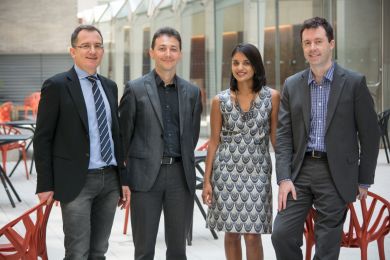Englander Institute joins international genomic medicine effort
Tumors sequenced at Weill Cornell Medicine/NewYork-Presbyterian could help further cancer research across the globe, as part of a newly expanded international clinical collaboration.
As a member of the International Cancer Genome Consortium (ICGC), the Caryl and Israel Englander Institute for Precision Medicine will contribute genomic data to a research effort that is mapping 25,000 different cancer genomes in 50 different tumor types for free use by qualified researchers around the world.
At the Annual Meeting of the American Association of Cancer Research in New Orleans on April 17, the consortium announced it will now link this data with clinical information -- including lifestyle, patient history, cancer diagnostic data, and response to and survival following therapies -- across the cancer continuum from pre-neoplastic lesions to metastases.
Using this large-scale integrated data, researchers, scientists, policymakers and clinicians will be able to work with patients, health care providers and others to develop preventative strategies, markers for early detection of disease, more specific criteria and methods for diagnoses and prognoses, and interventions based on matching the patient’s disease molecular subtype with the most effective combinations of therapies. The researchers and clinicians share data while also protecting the privacy of their patients.
“By combining the data and ingenuity of clinicians and scientists from around the world, and the selfless contribution of patients worldwide to allow access to their disease history and biology, there is a genuine opportunity to accelerate the pace of progress towards effective cancer control,” organizers wrote in a white paper outlining the new International Cancer Genome Consortium for Medicine (ICGCmed).
Although the rate of scientific discovery in the ‘omics era has opened the door to exciting new possibilities in the prevention and treatment of cancer, much work is needed before these possibilities can be implemented in existing infrastructures and healthcare systems, said Englander Institute Director Mark A. Rubin, a member of the ICGCmed Scientific Planning Committee.
Improved knowledge in this area will benefit patients as well as healthcare providers and payers, he added.
“Precision oncology for advanced cancer care has been a major focus of our Institute for years,” said Rubin, the Homer T. Hirst Professor of Oncology in Pathology. “Sharing data from our ethnically diverse New York population will create an important synergy and lead to better understanding of complex cancer cases.”



